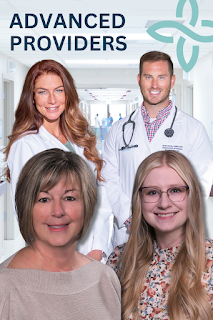I am not a doctor.
KCH Blog Post
Nurse
practitioners (NP) have been part of Knox County’s medical landscape for
nearly 25 years and nationally for even longer. Over the last decade, Knox
Community Hospital has increasingly employed advanced practice nurses in a
variety of clinical specialties and settings. You may encounter an NP in the
emergency department or urgent care, in specialty care offices, while you are
in the hospital, or you may see one routinely as your primary care provider.
I am
approaching 24 years of nursing practice, with nearly 10 of those years spent
working in our community as an NP. Even still, I occasionally get questions
about what I do, what my education is, what to call me, and, my personal favorite, when I will see the doctor. While these are never straight forward
answers, I appreciate the opportunity to help educate my patients as to my
professional practice and how I fit into their healthcare team.
There are
nurses with advanced degrees who do not hold the same licensure and
certification that I do, but for the purposes of this blog, I am going to focus
on the role of the NP, especially within the office setting. We are nurses who
have advanced education and training, holding at minimum a master’s degree in
nursing, who have obtained national certification and state licensure to serve
as independent healthcare practitioners. In many ways, we function in the same
way individuals think of when they remember their pediatrician or family
doctor. We can see patients, give a diagnosis, and provide a treatment plan. We
can order tests and prescribe medications. We work collaboratively with our
physician colleagues and other healthcare services in the community to provide
the highest quality of care to our patients, which sometimes includes a consultation
with another healthcare provider who might be a physician.
While
superficially, the NP and physician may practice in much the same way, there are
significant differences in our philosophy, education, and training. Physicians
embrace a medical model focusing on disease processes, while the NP
incorporates medicine into the nursing model. Nurse Practitioners focus not
only on the medical diagnosis but also on the patient’s experience with that
diagnosis. So, the NP might not only give you a diagnosis but also recognize your physical, emotional, or spiritual limitations within that diagnosis and help identify strategies to mitigate those challenges as well. This is why
patients often comment that their NP spent a lot of time with them, teaching
them about their diagnosis, medications, and treatment plan.
Some offices
serve their patients in a shared environment where you are not assigned just
one care provider and can see any of the providers in that office. In other
offices, you may be assigned to typically see just one person, who might be an NP,
in which case you would not routinely see a physician. Regardless, you can be
assured that your healthcare provider, whether physician or NP, has the skills
and education to provide you with the care you expect and deserve.
And finally,
no, I am not a doctor; I’m a nurse practitioner. Please call me Rachail.

.png)

